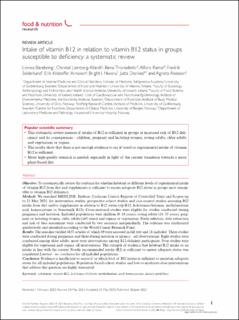| dc.contributor.author | Bärebring, Linnea | |
| dc.contributor.author | Lamberg-Allardt, Christel | |
| dc.contributor.author | Thorisdottir, Birna | |
| dc.contributor.author | Ramel, Alfons | |
| dc.contributor.author | Söderlund, Fredrik | |
| dc.contributor.author | Arnesen, Erik Kristoffer | |
| dc.contributor.author | Nwaru, Bright I. | |
| dc.contributor.author | Dierkes, Jutta | |
| dc.contributor.author | Åkesson, Agneta | |
| dc.date.accessioned | 2024-02-12T12:26:02Z | |
| dc.date.available | 2024-02-12T12:26:02Z | |
| dc.date.created | 2023-09-05T10:23:19Z | |
| dc.date.issued | 2023 | |
| dc.identifier.issn | 1654-6628 | |
| dc.identifier.uri | https://hdl.handle.net/11250/3116988 | |
| dc.description.abstract | Objective: To systematically review the evidence for whether habitual or different levels of experimental intake of vitamin B12 from diet and supplements is sufficient to ensure adequate B12 status in groups most susceptible to vitamin B12 deficiency.
Methods: We searched MEDLINE, Embase, Cochrane Central Register of Controlled Trials and Scopus up to 21 May 2021, for intervention studies, prospective cohort studies and case-control studies assessing B12 intake from diet and/or supplements in relation to B12 status (s/p-B12, holotranscobalamin, methylmalonic acid, homocysteine or breastmilk B12). Cross-sectional studies were eligible for studies conducted during pregnancy and lactation. Included populations were children (0–18 years), young adults (18–35 years), pregnant or lactating women, older adults (≥65 years) and vegans or vegetarians. Study selection, data extraction and risk of bias assessment were conducted by two assessors independently. The evidence was synthesized qualitatively and classified according to the World Cancer Research Fund.
Results: The searches yielded 4855 articles of which 89 were assessed in full text and 18 included. Three studies were conducted during pregnancy and three during lactation or infancy – all observational. Eight studies were conducted among older adults; most were interventions among B12-deficient participants. Four studies were eligible for vegetarian and vegans, all interventions. The strength of evidence that habitual B12 intake or an intake in line with the current Nordic recommended intake (RI) is sufficient to ensure adequate status was considered Limited – no conclusion for all included populations.
Conclusion: Evidence is insufficient to assess if or which level of B12 intake is sufficient to maintain adequate status for all included populations. Population-based cohort studies and low-to-moderate dose interventions that address this question are highly warranted. | en_US |
| dc.language.iso | eng | en_US |
| dc.publisher | Swedish Nutrition Foundation | en_US |
| dc.rights | Navngivelse 4.0 Internasjonal | * |
| dc.rights.uri | http://creativecommons.org/licenses/by/4.0/deed.no | * |
| dc.title | Intake of vitamin B12 in relation to vitamin B12 status in groups susceptible to deficiency: a systematic review | en_US |
| dc.type | Journal article | en_US |
| dc.type | Peer reviewed | en_US |
| dc.description.version | publishedVersion | en_US |
| dc.rights.holder | Copyright 2023 The Author(s) | en_US |
| dc.source.articlenumber | 8626 | en_US |
| cristin.ispublished | true | |
| cristin.fulltext | original | |
| cristin.qualitycode | 1 | |
| dc.identifier.doi | 10.29219/fnr.v67.8626 | |
| dc.identifier.cristin | 2172398 | |
| dc.source.journal | Food & Nutrition Research (FNR) | en_US |
| dc.identifier.citation | Food & Nutrition Research (FNR). 2023, 67, 8626 . | en_US |
| dc.source.volume | 67 | en_US |

